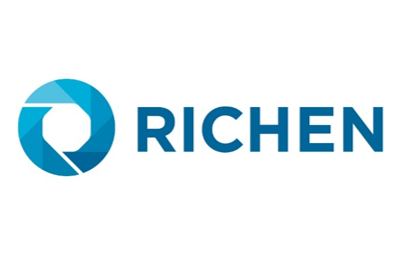导读
2021年4月19日,欧洲临床营养与代谢协会(European Society for Clinical
Nutrition and Metabolism, ESPEN)在其官方杂志Clinical Nutrition上在线发布了最新版的外科患者营养治疗实践指南(ESPEN Practical Guideline: Clinical
Nutrition in Surgery)。该指南从临床实用性出发,对2017年ESPEN外科患者营养治疗指南进行缩减,从外科患者营养治疗的总体原则到特殊类型外科患者的个体化营养治疗,总计给出37条推荐(内容没有变化),并添加了流程图,更加便于临床医师、营养师及护士等在临床实践中使用。

一、总则
1.1术前是否需要禁食?
推荐1
Preoperative fasting from midnight is
unnecessary in most patients. Patients undergoing surgery, who are considered
to have no specific risk of aspiration, shall drink clear fluids until two
hours before anesthesia. Solids shall be allowed until six hours before
anesthesia. (Grade of recommendation A – strong consensus)
大部分患者不需要从术前当晚开始禁食。无误吸风险的患者可在麻醉前2小时饮用清流质,麻醉前6小时进食固体食物。(推荐等级A-强烈同意)
1.2择期手术患者使用碳水化合物进行术前代谢准备能否获益?
推荐2
In
order to reduce perioperative discomfort including anxiety oral preoperative
carbohydrate treatment (instead of overnight fasting,
the night before and two hours before surgery) should be administered (B). To impact postoperative insulin resistance and LOS, preoperative carbohydrates can be considered in patients undergoing major surgery (0). (Grade of
recommendation B/0 – strong consensus)
手术前夜以及术前2小时口服碳水化合物(不需要术前禁食禁饮)有助于减少焦虑等不适(B)。大手术患者可考虑术前使用碳水化合物改善术后胰岛素抵抗和缩短住院时间(Length of stay, LOS)(0)。(推荐等级B/0-强烈同意)
1.3术后是否有必要中断经口营养摄入?
推荐3
In most instances, oral nutritional
intake shall be continued after surgery without interruption. (Grade of
recommendation A – strong consensus)
大部分患者在术后继续口服营养摄入。(推荐等级A-强烈同意)
推荐4
It is recommended to adapt oral intake
according to individual tolerance and to the type of surgery carried out with
special caution to elderly patients. (Grade of recommendation GPP – strong
consensus)
推荐根据个体耐受情况及手术类型调整口服营养方案,尤其是老年患者应更加谨慎。(推荐等级GPP-强烈同意)
推荐5
Oral intake, including clear liquids,
shall be initiated within hours after surgery in most patients. (Grade of recommendation A – strong
consensus)
大部分患者在术后数小时内即可开始恢复流质等经口摄入。(推荐等级A-强烈同意)
二、营养治疗的指征
2.1外科患者何时进行营养评估和营养治疗?
推荐6
It is recommended to assess the
nutritional status before and after major surgery. (Grade of recommendation GPP
– strong consensus)
推荐在大手术前后评估患者的营养状况。(推荐等级GPP-强烈同意)
推荐7
Perioperative nutritional support
therapy is indicated in patients with malnutrition and those at nutritional
risk. Perioperative nutritional therapy should also be initiated if it is
anticipated that the patient will be unable to eat for more than five days
perioperatively. It is also indicated in patients expected to have low oral
intake and who cannot maintain above 50% of the recommended intake for more
than seven days. In these situations, it is recommended to initiatenutritional support therapy (preferably by the enteral route – oral
nutritional supplements – tube feeding) without delay. (Grade of recommendation
GPP – strong consensus)
推荐对存在营养不良及营养风险的患者开展围手术期营养治疗。若预计围手术期超过5天无法经口进食,或经口进食低于50%推荐摄入量超过7天,也应尽快开展围手术期营养治疗(首选肠内途径,包括口服营养补充(Oral nutritional supplements,ONS)和管饲营养)。(推荐等级GPP-强烈同意)
推荐8
If the energy and nutrient
requirements cannot be met by oral and enteral intake alone (<50% of caloric
requirement) for more than seven days, a combination of enteral and parenteral
nutrition (PN) is recommended (GPP). PN shall be administered as soon as
possible if nutrition therapy is indicated and there is a contraindication for
enteral nutrition (EN), such as in intestinal obstruction. (A) (Grade of recommendation GPP/A – strong
consensus)
若单独经口和经肠内营养无法满足能量及营养需求(<50%热卡需求)超过7天,推荐联合使用肠内营养(enteral nutrition,EN)与肠外营养(parental nutriton,PN)(GPP)。若患者需要营养治疗但存在EN禁忌(如肠梗阻),推荐尽早开展PN(A)。(推荐等级GPP/A-强烈同意)
推荐9
For the administration of PN, an
all-in-one (three-chamber bag or pharmacy prepared) should be preferred instead
of a multibottle system. (Grade of recommendation B – strong consensus)
PN应以全合一(三腔袋或药房配置)形式给予,而不是多瓶分开输注。(推荐等级B-强烈同意)
推荐10
SOPs for nutritional support are
recommended to secure effective nutritional support therapy. (Grade of recommendation GPP – strong
consensus)
推荐按照标准操作流程(Standard operating procedure, SOP)进行营养治疗以保障营养治疗的有效性。(推荐等级GPP-强烈同意)
2.2谷氨酰胺的使用指征是什么?
推荐11
Parenteral glutamine supplementation
may be considered in patients who cannot be fed adequately enterally and,
therefore, require exclusive PN. (Grade of recommendation 0 –consensus)
推荐EN无法满足营养需求而必须行PN的患者使用谷氨酰胺添加制剂。(推荐等级0-强烈同意)
2.3单独补充精氨酸(经静脉或肠内)的指征是什么?
Currently, no clear recommendation can
be given regarding the intravenous or enteral supplementation of arginine as a
single substance (0). Evidence is insufficient to suggest the use of arginine
alone.
单独经静脉或肠内补充精氨酸的证据尚不充分,暂无法对精氨酸的单独使用给出明确推荐意见(0)。
2.4静脉补充omega-3脂肪酸的指征是什么?
推荐12
Postoperative PN including
omega-3-fatty acids should be considered only in patients who cannot be
adequately fed enterally and, therefore, require PN.(Grade of recommendation B – majority
agreement)
术后PN(含omega-3脂肪酸)仅在EN不能满足营养需求的情况下考虑使用。(推荐等级B-大部分同意)
2.5富含免疫营养素的特殊口服/肠内营养配方的使用指征是什么?
推荐13
Peri- or at least postoperative
administration of specific formula enriched with (arginine, omega-3-fatty
acids, ribonucleotides) should be given in malnourished patients undergoing
major cancer surgery (B). There is currently no clear evidence for the sole use
of these formulas enriched with immunonutrients vs. standard oral nutritional
supplements (ONS) in the preoperative period (0). (Grade of recommendation B/0
– consensus)
推荐行癌症大手术的营养不良患者在围手术期或至少在术后使用富含精氨酸、omega-3脂肪酸、核糖核苷酸的特殊营养制剂(B)。目前尚无充分证据证明术前单独使用含此类特殊免疫营养制剂的ONS的效果优于普通ONS。(推荐等级B/0-同意)
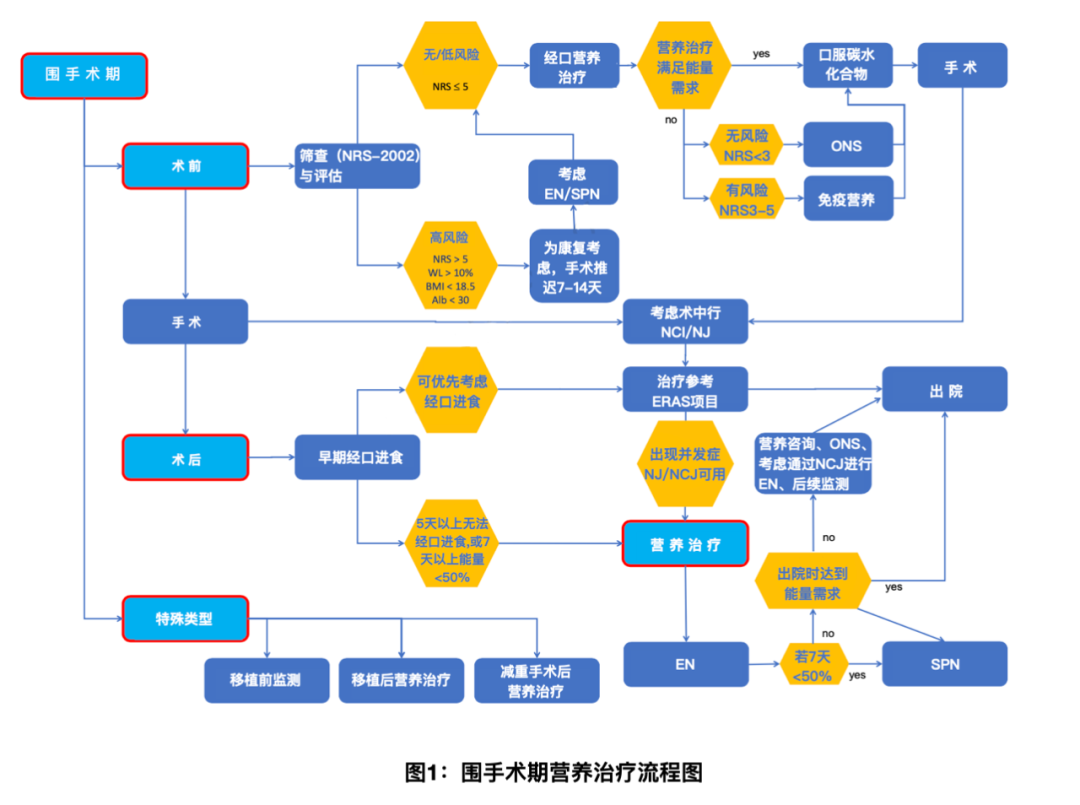
三、术前营养治疗
3.1哪些患者可以从术前营养治疗中获益?
推荐14
Patients with severe nutritional risk
shall receive nutritional therapy prior to major surgery (A) even if operations
including those for cancer have to be delayed (BM). A period of seven to 14
days may be appropriate (0). (Grade
of recommendation A/0 – strong consensus)
有严重营养风险的患者在大手术前应接受营养治疗(A),即使是对癌症患者也应该推迟手术(BM)。一般来说,营养治疗时间为7-14天较为合适(0)。(推荐等级A/0-强烈同意)
推荐15
Whenever feasible, the oral/enteral
route shall be preferred (A). (Grade of recommendation A – strong consensus)
经口或肠内途径是营养治疗的首选。(推荐等级A-强烈同意)
3.2术前使用口服营养补充/肠内营养的时机是什么?
推荐16
When patients do not meet their energy
needs from normal food, it is recommended to encourage these patients to take
ONS during the preoperative period unrelated to their nutritional status. (Grade
of recommendation GPP – consensus)
当正常饮食无法满足患者的能量需求时,无论其营养状态如何都推荐在术前使用ONS。(推荐等级GPP-强烈同意)
推荐17
Preoperatively, ONS shall be given to
all malnourished cancer and high-risk patients undergoing major abdominal
surgery. A special group of high-risk patients are the elderly people with
sarcopenia. (Grade of recommendation A – strong consensus)
推荐所有营养不良的肿瘤患者或营养不良高风险患者在腹部大手术前使用ONS。老年肌少症患者是一类特殊的营养不良高危人群。(推荐等级A-强烈同意)
推荐18
Immune modulating ONS including arginine,
omega-3 fatty acids, and nucleotides can be preferred (0) and administered for
five to seven days preoperatively (GPP). (Grade of recommendation 0/GPP –
majority agreement)
推荐术前使用含精氨酸、omega-3脂肪酸及核糖核苷酸的免疫调节型ONS(0),并建议在术前使用5-7天(GPP)。(推荐等级0/GPP-大部分同意)
推荐19
Preoperative EN / ONS should
preferably be administered prior to hospital admission to avoid unnecessary
hospitalization and to lower the risk of nosocomial infections. (Grade of
recommendation GPP – strong consensus)
推荐在入院前开展术前EN或ONS以避免不必要的住院并降低院内感染率。(推荐等级GPP-强烈同意)
3.3术前使用PN的指征是什么?
推荐20
Preoperative PN shall be administered
only in patients with malnutrition or severe nutritional risk where energy
requirement cannot be adequately met by EN (A). A period of 7-14 days is
recommended (0). (Grade of recommendation A/0 – strong consensus)
对营养不良或营养不良高风险患者,若EN无法满足能量需求,术前应使用PN(A)。推荐术前PN使用时间为7-14天(0)。(推荐等级A/0-强烈同意)
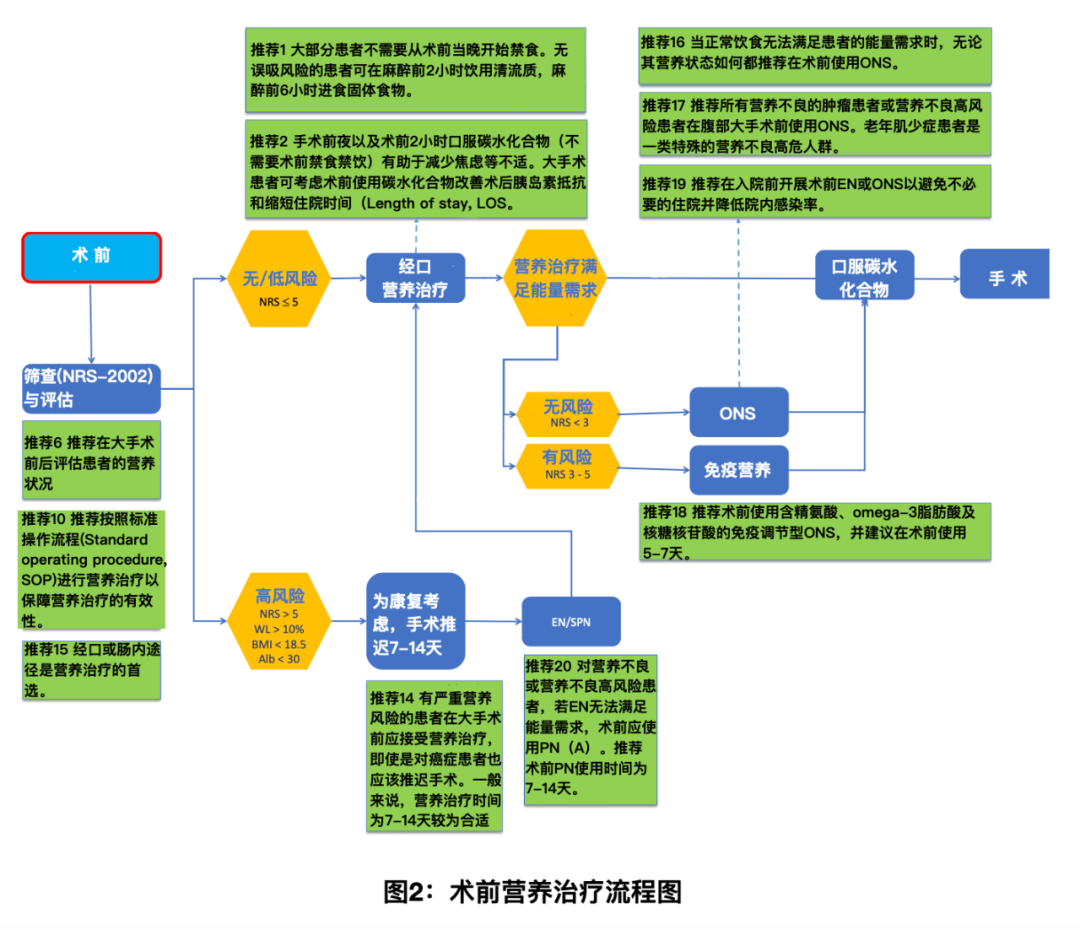
四、术后营养治疗
4.1哪些患者可以从术后早期EN中获益?
推荐21
Early EN (within 24 h) shall be
initiated in patients in whom early oral nutrition cannot be started, and in
whom oral intake will be inadequate (<50%) for more than seven days
· patients undergoing major head
and neck or gastrointestinal surgery for cancer (A)
· patients with severe trauma
including brain injury (A)
· patients with obvious
malnutrition at the time of surgery (A) (GPP) (Grade of recommendation A/GPP –
strong consensus)
对早期无法经口进食或经口摄入量无法满足营养需求(<50%)超过7天的患者,应术后早期(24小时内)实施EN。
· 接受头颈部大手术或胃肠道癌症手术的患者(A)
· 脑损伤等严重创伤患者(A)
· 围手术期存在明显营养不良的患者(A)(GPP)(推荐等级A/GPP-强烈同意)
4.2营养制剂的配方如何选择?
推荐22
In most patients, a standard whole
protein formula is appropriate. For technical reasons with tube clotting and
the risk of infection, the use of home- made diets for EN is not recommended in
general. (Grade of recommendation GPP – strong consensus)
标准整蛋白配方适用于大部分患者。从堵管及感染风险等技术原因考虑,一般不推荐使用家庭自制食物开展EN。(推荐等级GPP-强烈同意)
4.3术后如何选择管饲方式?
推荐23
With special regard to malnourished
patients, placement of a nasojejunal tube or NCJ should be considered for all
candidates for EN undergoing major upper gastrointestinal and pancreatic
surgery. (Grade of recommendation B – strong consensus)
对需要EN的上消化道及胰腺大手术的营养不良患者,应放置鼻肠管或空肠穿刺管进行营养治疗。(推荐等级B-强烈同意)
推荐24
EN shall be initiated within 24 hours
after surgery. (Grade of recommendation A – strong consensus)
推荐术后24小时内开展EN。(推荐等级A-强烈同意)
推荐25
It is recommended to start EN with a
low flow rate (e.g. 10 – max. 20 ml/h) and to increase the feeding rate
carefully and individually due to limited intestinal tolerance. The time to
reach the target intake can be very different and may take five to seven days. (Grade
of recommendation GPP – consensus)
推荐从低流量(如10-20 ml/h)开始,逐步根据患者个体肠道耐受程度缓慢提高滴速。每个患者达到目标摄入量的时间不同,可能需要5-7天。(推荐等级GPP-同意)
推荐26
If long-term EN (>4 weeks) is
necessary, e.g. in severe head injury, placement of a percutaneous tube (e.g. percutaneous
endoscopic gastrostomy – PEG) is recommended. (Grade of recommendation GPP –
strong consensus)
对严重头颅创伤等需长期实施EN(>4周)的患者,推荐采用经皮导管途径(如经皮内镜胃造瘘术-PEG)开展EN。(推荐等级GPP-强烈同意)
4.4哪些患者出院后可以从EN中获益?
推荐27
Regular reassessment of nutritional
status during the stay in hospital and, if necessary, a continuation of
nutritional support therapy including qualified dietary counseling after
discharge, is advised for patients who have received nutritional support therapy
perioperatively and still do not cover appropriately their energy requirements
via the oral route. (Grade of recommendation GPP – strong consensus)
对围手术期接受营养治疗但通过经口摄入未达到能量需求的患者,住院期间应定期进行营养评估,必要时在出院后应继续进行包括营养咨询在内的营养治疗。(推荐等级GPP-强烈同意)
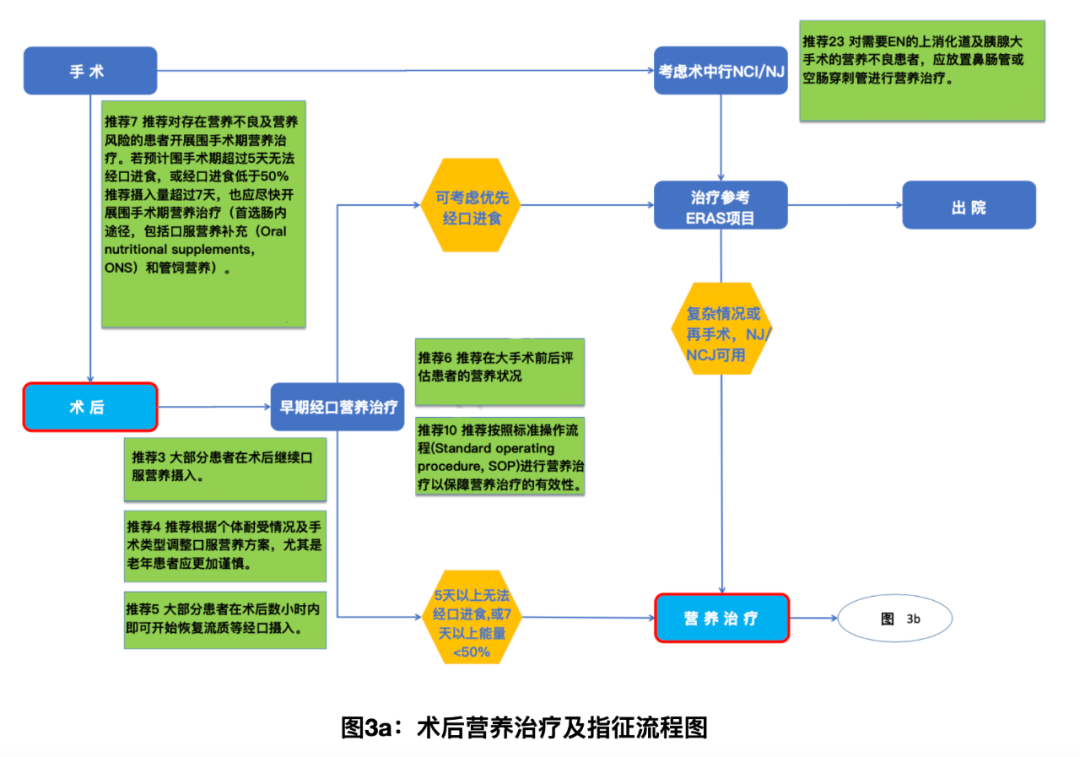
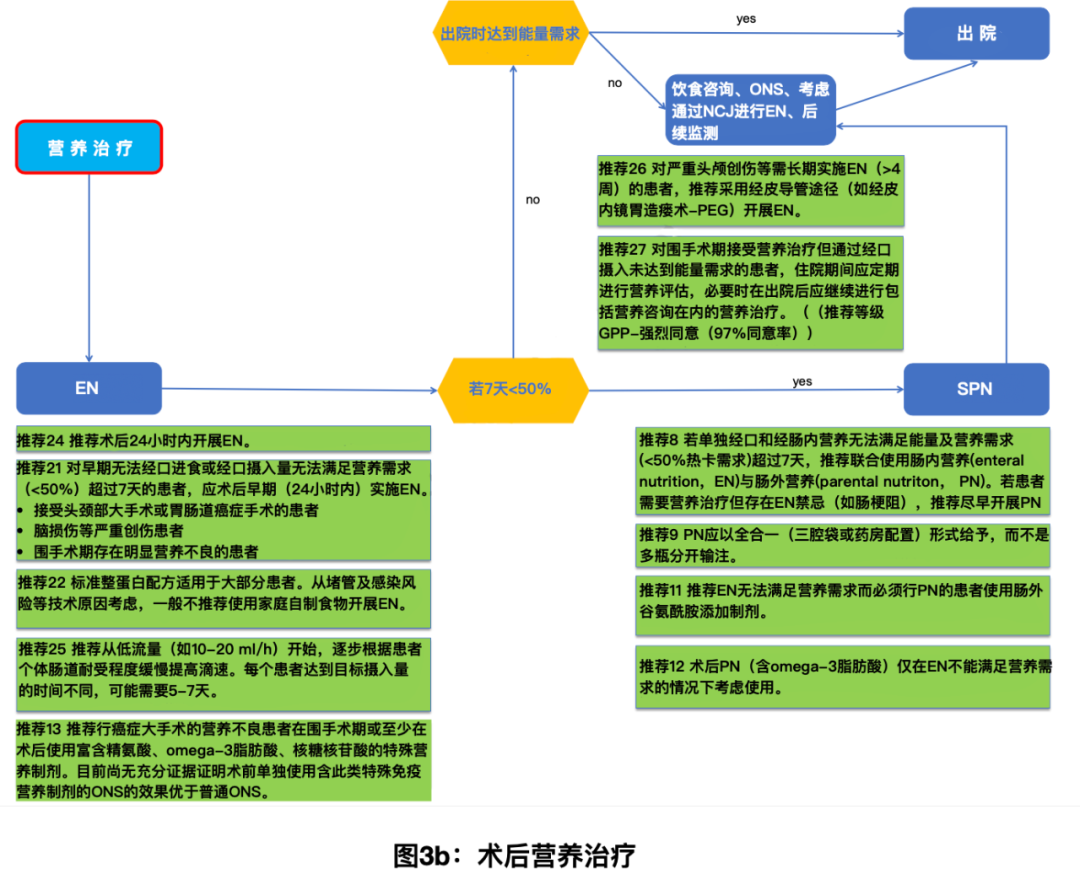
五、器官移植
5.1实体器官移植前EN的指征是什么?
推荐28
Malnutrition is a major factor
influencing outcome after transplantation, so monitoring of the nutritional
status is recommended. In malnutrition, additional ONS or even EN is advised. (Grade
of recommendation GPP – strong consensus)
营养不良是影响移植结局的重要因素,因而推荐开展营养状况监测,并对营养不良患者使用ONS或EN。(推荐等级GPP-强烈同意)
推荐29
Regular assessment of nutritional
status and qualified dietary counselling shall be required while monitoring
patients on the waiting list before transplantation. (Grade of recommendation
GPP – strong consensus)
对等待移植的患者应开展定期营养评估和营养咨询。(推荐等级GPP-强烈同意)
推荐30
Recommendations for the living donor
and recipient are no different from those for patients undergoing major
abdominal surgery. (Grade of recommendation GPP – strong consensus)
移植供体与受体的营养治疗推荐与腹部大手术患者相似。(推荐等级GPP-强烈同意)
5.2实体器官移植后何时开始营养治疗?
推荐31
After heart, lung, liver, pancreas,
and kidney transplantation, early intake of normal food or EN is recommended
within 24h. (Grade of recommendation GPP – strong consensus)
心、肺、肝、胰腺及肾脏移植术后24小时内应早期经口正常进食或使用EN。(推荐等级GPP-强烈同意)
推荐32
Even after transplantation of the
small intestine, EN can be initiated early but should be increased very
carefully within the first week. (Grade of recommendation GPP – strong
consensus)
即使是小肠移植,术后早期也可早期启动EN,但EN第一周应注意缓慢加量。(推荐等级GPP-强烈同意)
推荐33
If necessary EN and PN should be
combined. Long-term nutritional monitoring and qualified dietary counseling are
recommended for all transplants. (Grade of recommendation GPP – strong
consensus)
必要时EN与PN可联合使用。推荐对所有移植患者开展长期营养监测及营养咨询。(推荐等级GPP-强烈同意)
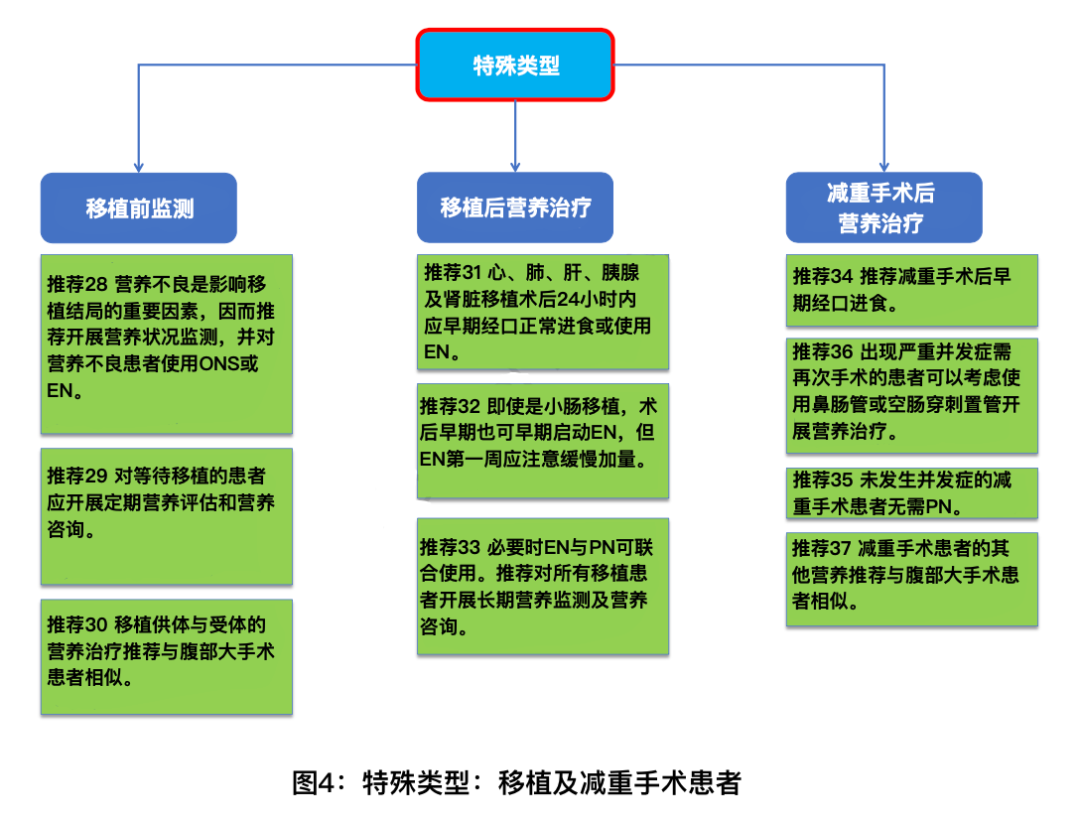
六、减重手术
6.1减重手术围手术期何时进行营养治疗?
推荐34
Early oral intake can be recommended
after bariatric surgery. (Grade of recommendation 0 – strong consensus)
推荐减重手术后早期经口进食。(推荐等级0-强烈同意)
推荐35
PN is not required in uncomplicated
bariatric surgery. (Grade of recommendation 0 – strong consensus)
未发生并发症的减重手术患者无需PN。(推荐等级0-强烈同意)
推荐36
In case of a major complication with
relaparotomy, the use of a nasojejunal tube/NCJ may be considered. (Grade of
recommendation 0 – consensus)
出现严重并发症需再次手术的患者可以考虑使用鼻肠管或空肠穿刺置管开展营养治疗。(推荐等级0-同意)
推荐37
Further recommendations are not
different from those for patients undergoing major abdominal surgery (0). (Grade
of recommendation 0 – strong consensus)
减重手术患者的其他营养推荐与腹部大手术患者相似。(推荐等级0-强烈同意)
